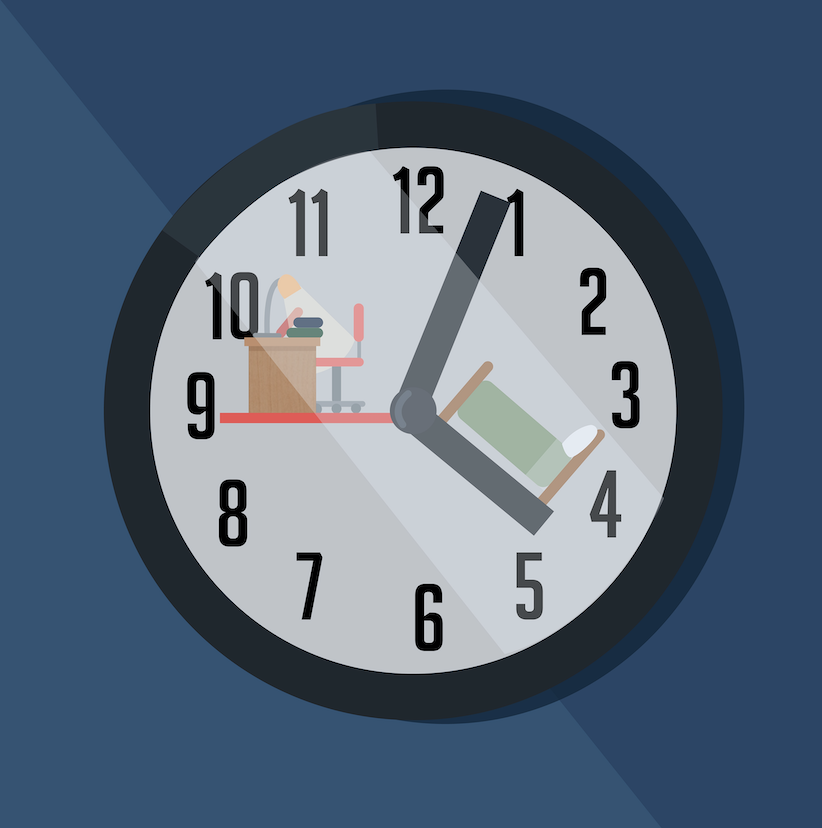OPINION: Students must stop glorifying sleep deprivation

In recent years, social media has seen the rise of student-centered social media pages and groups, where students bond over shared experiences by posting humorous content. One of the most widely satirized topics is sleep, or students’ lack thereof. It is quite common to see memes with labels like “sleep is for the weak” and “sometimes when I sneeze, my eyes close.” While there is no harm in finding these posts humorous, they have inadvertently fostered a student culture in which sleep deprivation is normalized and even portrayed as an integral part of the college experience. By masking this dangerous habit with humor, it has become easy to ignore the serious consequences of neglecting sleep.
Sleep deprivation is not always a conscious choice for students — given the demands of school, work and extracurricular activities, it often feels like the only way to get everything done is by staying up late. On the other hand, when students do have free time and the chance to sleep earlier, they often feel pressured to fill up their schedule with more commitments due to the work-oriented mindset that persists in the college environment. Sacrificing sleep to cram in more work or activities is commended as a fruitful means of productivity, and the digital and campus culture that glorifies sleep deprivation validates this notion. However, all of the research in the field indicates that sleep has an adverse effect on productivity.
Sleep scientists have equated sleep deprivation to drunkenness — 17 to 19 continuous hours of being awake impairs cognitive functioning to the same extent as a blood alcohol concentration of 0.05, and longer periods push that number to 0.1. In both cases, the impact on cognitive performance includes shorter attention span, declined decision-making abilities and lower reaction time. More dangerously, most people who are sleep deprived do not realize how limited their mental faculties are similar to people who drive drunk.
This is especially harmful for students who pull all-nighters to cram for exams, believing that staying up longer gives them time to take in more information. Research has shown that without sufficient time to recharge at night, people not only work more slowly, but also make more careless mistakes. Furthermore, the brain commits all the information studied throughout the day to long-term memory when people are asleep. This means that even if students stay up all night to study more material last minute, they’re unlikely to remember it come exams.
In addition to causing cognitive slump short-term, lack of sleep also has far reaching consequences on emotional well-being. Students are already under a lot of stressors that put them at risk for mental health disorders like depression and anxiety, and prolonged wakefulness will only exacerbate the onset of these disorders. A study in the Journal of General Internal Medicine showed that medical interns who were chronically sleep deprived demonstrated higher levels of depression than their peers who were sleeping a healthy amount. This is because lack of sleep hurts the part of the brain responsible for mood regulation, hindering people’s abilities to cope with negative emotions in a healthy way. As mental health becomes a more widely discussed topic on college campuses, it is time to start making the importance of sleep a central part of the conversation.
As assignments pile up, it is common for students to stay up late under the pretense that just one late night will not have any dire consequences in the long run. However, just one late night can turn into an accumulation of sleepless nights over the years spent in university. In the long run, this build-up of prolonged wakefulness has extremely negative effects on physical health, including heart disease, diabetes and ultimately a shorter lifespan.
The current trend of glorifying sleep deprivation on social media causes students to believe pulling all-nighters are not only expected, but impressive feats. However, considering both the mental and physical repercussions of sleep deprivation, all-nighters should be met with concern for the student’s health instead.
With exams approaching, it is more important than ever to recognize that sleep is an integral factor in academic success, not a barrier to it. Furthermore, long-term, physical and emotional well-being is far more important than an exam grade. Students must recognize that promoting sleep deprivation is toxic to both themselves and their peers and discard these perceptions to foster a healthy relationship with sleep.

